I want to learn...
Understanding and using future tenses correctly can greatly enhance your ability to express future actions, events, and possibilities.
In this article, we will explore the different future tenses in Spanish and their formation rules. We will also provide you with essential tips to help you navigate these tenses with confidence.
The simple future tense in Spanish
Like its name implies, this is the most basic and most commonly used form of future tense in Spanish. It is used to express actions or events that will happen in the future.
Simple future tense
| Subject Pronoun | Termination | Examples |
|---|---|---|
| Yo | -é | Hablar (Speak) → Hablaré |
| Tú | -ás | Comer (Eat) → Comerás |
| Él / Ella | -á | Vivir (Live) → Vivirá |
| Usted | -á | Leer (Read) → Leerá |
| Nosotros | -emos | Bailar (Dance) → Bailaremos |
| Vosotros | -eis & éis | Cantar (Sing) → Cantaréis |
| Ellos / Ellas | -án | Saltar (Jump) → Saltarán |
| Ustedes | -án | Estudiar (Study) → Estudiarán |
The future perfect tense in Spanish
The future perfect tense is used to express actions or events that will have been completed by a certain point in the future.
To form it you’ll need to use the verb “haber” as an auxiliary in the simple future tense, and the past participle of the main verb.
Future perfect tense
| Subject Pronoun | Haber | Past participle |
|---|---|---|
| Yo | Habré | Comido (Eaten) |
| Tú | Habrás | Cocinado (Cooked) |
| Él / Ella | Habrá | Bailado (Danced) |
| Usted | Habrá | Leído (Read) |
| Nosotros | Habremos | Cantado (Sang) |
| Vosotros | Habréis | Contado (Counted) |
| Ellos / Ellas | Habrán | Empacado (Packed) |
| Ustedes | Habrán | Estudiado (Studied) |
The future continuous tense in Spanish
The future continuous tense is used to express actions that will be ongoing or in progress at a specific point in the future.
To form the tense, you need to use the future tense of the verb“(to be), followed by the present participle (-ando for -ar verbs, -iendo for -er and -ir verbs):
Future continuous tense
| Subject Pronoun | Estar | Present participle |
|---|---|---|
| Yo | Estaré | Comiendo (Eating) |
| Tú | Estarás | Cocinando (Cooking) |
| Él / Ella | Estará | Bailando (Dancing) |
| Usted | Estará | Leyendo (Reading) |
| Nosotros | Estaremos | Haciendo (Doing) |
| Vosotros | Estaréis | Diciendo (Saying) |
| Ellos / Ellas | Estarán | Empacando (Packing) |
| Ustedes | Estarán | Estudiando (Studying) |
Tips for mastering future tenses
Understanding future tenses fully is not easy, but here you have some tips.
Regular practice: Practice future tenses regularly in both written and spoken exercises. This will help you internalize the rules and gain fluency.
Pay attention to irregular verbs: Some verbs have irregular conjugations in future tenses. Make sure to familiarize yourself with these irregularities and practice them separately.
Listen and speak: Engaging in conversations will expose you to natural usage of future tenses. Practice speaking and use future tenses actively to improve your fluency. Busuu has an immense community of speakers to help you out.
Future tenses in Spanish are one of the basic skills that will help you communicate in the language.
By understanding the rules and formations of the simple future, future perfect, and future continuous tenses, as well as by following the provided tips, you can develop your confidence and proficiency in Spanish.
Regular practice, contextual understanding, and exposure to real Spanish usage will be key in your journey towards becoming a proficient Spanish speaker.
Newlanguages


